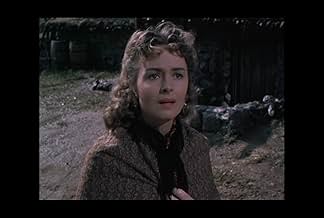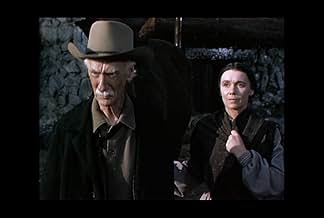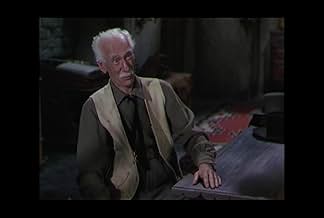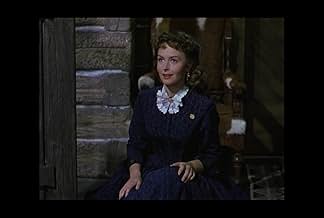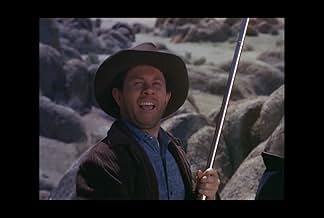Adicionar um enredo no seu idiomaA Confederate Major and his troops are falsely led to believe the Civil War is not over, and become wanted men after they attack a Union Army wagon train in Nevada.A Confederate Major and his troops are falsely led to believe the Civil War is not over, and become wanted men after they attack a Union Army wagon train in Nevada.A Confederate Major and his troops are falsely led to believe the Civil War is not over, and become wanted men after they attack a Union Army wagon train in Nevada.
- Union Captain
- (não creditado)
- Drifter
- (não creditado)
- Hank Fletcher
- (não creditado)
- Stage Driver
- (não creditado)
- Drifter
- (não creditado)
Avaliações em destaque
As Scott grew older in his acting career, he made predominately Westerns. At the same time his face grew harder, more sinewy and austere. Something of his matinee idol looks and southern accent remained, but age brought something else - a moral gravitas than added immeasurably to his on-screen presence. Finally the 'Scott character' achieved a magisterial quality - a characteristic that added immeasurably to the ironic resonance of his last film Ride The High Country.
In Hangman's Knot, Scott plays a Confederate officer who only learns that the Civil War is over after a successful action in which his group take a gold shipment from Union soldiers. He and his men agree to return home, each with their share of the booty, but run across some outlaws who corner them in a way station, laying siege to them.
This is a situation familiar to those who know those later Scott-Boetticher masterpieces, and the familiar hallmarks are already in evidence. Even the same locations are utilised. Like the later films with a different director, this is a morality play, almost a chamber drama, where Scott makes a dignified stand of principle. In Hangman's Knot, those with the dark hearts are both outside the way station's walls waiting to pounce, as well as inside (a characteristic performance by Lee Marvin, reminiscent of that he gives in The Big Heat). These are the men that Scott's character, Stewart, cannot relate to: those without honour or moral courage, greedy, cruel men. For Scott, as he says in one of those later films, 'there are some things a man can't ride around' and these are the choices that have to be made. A man needs to face up to his options in life and live with himself on or off the trail. When he tells Marvin here that he 'never really knew (him) at all', we know the moral battlelines have been drawn, just as distinctly those that existed between the warring states.
At first the gold is merely the spoils of war. Then it becomes a short cut to happiness, an unexpected reward for the men's trouble, and a compensation for the loss of the War. Finally it is just a moral encumbrance, both to body and mind. By the end of the film, as Scott and the boy let the heavy saddle bags slip off their shoulders, the sense of relief is tangible - one which isn't just physical.
A film well worth investigating, full of artistic resonance and anticipations. And if you haven't seen the later Scott-Boetticher vehicles, some of the greatest B-Westerns ever made, see this as a taster.
They don't come much more taut than this, and its success only brings into question as to why director Roy Huggins never made another film as director. This one really begins to approach the later Boetticher films, being set in an isolated way station, as several of Budd's films happened to be, with Randy as a Confederate officer, who has stolen Union gold, not knowing the war is over.
Outlaws, learning of the loot, besiege the soldiers at the way station, but just as much danger comes from within - the menacing soldier played by Lee Marvin. The cast is better than those in the then most recent Scott vehicles, including Donna Reed, Claude Jarman, Jr., Richard Denning and Guinn "Big Boy Williams. Randy's son C.H. Scott, in the book "Whatever Happened to Randolph Scott" speaks fondly of Donna Reed, as if she was a second mother, and says that she and his father never lost touch over the years, and were devoted to each other.
Omitting the Boetticher films, this one is clearly the strongest Scott offering of the 1950s. That Huggins never directed a feature film again (he did direct a 1970 TV movie) is more our loss than his. Huggins did quite well in the long run, with items like Maverick, Rockford Files and The Fugitive in his future.
With much of the film set within the way station, Huggins manages to keep the tension high as Scott has to deal with the group of bounty hunters outside (led by Ray Teal in a rousing performance) and the wayward loose cannon Ralph, the Lee Marvin character. Lee must have impressed producer Scott as he got a much showier role in the first Scott-Boetticher classic SEVEN MEN FROM NOW. Meanwhile, Scott must serve as surrogate big brother of Claude Jarman Jr, no longer the little boy of THE YEARLING and in fact nearly as tall as the film's lead star.
Richard Denning also impresses in his part as Donna Reed's fiancée, a character as weak-willed as the fiancée in the later Boetticher film THE TALL T. At first willing to call attention to an attempted escape by Scott and company (despite giving his word otherwise), he later bargains to give them an alternate plan of escape - in exchange for two bars of the captured gold.
My favorite of Scott's 50's westerns prior to his Boetticher films and dollar for dollar, the equal of many much bigger budgeted items from the likes of Wayne and Cooper.
The story written by Huggins concerns the final days of the tumultuous Civil War that not only split the nation asunder, but families and friends as well. Major Matt (Scott) is in command of a small band of rebel soldiers whose assignment is to hijack a union gold shipment in far off Nevada and take no prisoners. They succeed only to learn that Lee surrendered to Grant several weeks earlier. What to do? The major and his rebels decide to keep the gold and determine what to do with it later. The only rascal amongst the rebels is Ralph, an early role for Lee Marvin, who as usual steals the show. It seems his meanness has only grown as a result of all the violence he has experienced during the war. His killer proclivities have come to dominate his psyche. Though old pals in the saddle, Ralph and the Major are continually at each other's throats. Also a member of the rebels is a youngster who has not yet tasted blood, Jamie (Claude Jarman Jr. who first scored big as a twelve-year-old in "The Yearling").
As the rebels make their getaway, knowing that they will be hunted down as murderers and traitors by the Yankees, they are set upon by a gang of outlaws who claim to be seeking justice but who really want the gold. The rebels are chased to an outpost via stagecoach where they hold up in what turns out to be a standoff. The leader of the outlaw gang is Quincey, portrayed by veteran actor Ray Teal in one of his best roles. He was always a reliable actor who could be counted on to give a good performance. But this time he goes beyond the expected and turns in one of the best acting jobs ever. Today he is most famous for playing Sheriff Roy Coffee in the ever popular "Bonanza" TV series. Another surprise is to see Guinn 'Big Boy' Williams, who usually played good old boy types, half-comic, half tough guy, as one of the meanest hombres around, Smitty. He is more sadistic and cruel than Lee Marvin in this film, which is saying a lot. Sweet Donna Reed is, well, sweet, but handles the part of a nurse, Molly, engaged to a slime ball, Lee Kemper (Richard Denning of TV's Mr. North fame), beautifully. Jeanette Nolan and Clem Bevans are effective as daughter and father of a young man who died in battle after his father had been killed in the war. The lead role is filled admirably by Randolph Scott. He captures all the nuances and contradictions of Major Matt while remaining charming enough to capture the heart of Nurse Molly. The rest of the cast including the redoubtable Frank Faylen provides the necessary support for this excellent western.
The title "Hangman's Knot" is metaphoric. Literally, the knot is tied to hang Cass (Faylen), but the knot also stands for the symbolic noose around the neck of each character for various reasons explored by the interaction of a great cast.
"Hangman's Knot" lacks those roll-your-eyes elements typical of too many older Westerns and benefits from a confined-location plot that's conducive to characterization. Many of the characters are corrupted by the bloody four-year war or just plain greed while some try to maintain a sense of honor amidst the madness. Despite the many deaths, the climax leaves you with a good feeling. Contrived or not, it's inspiring.
The film runs 81 minutes and was shot in Alabama Hills, Lone Pine and Ray Corrigan Ranch, Simi Valley, California.
GRADE: B
The jarring note was the obligatory romance for Westerns of this period, this time between 54-year-old Scott (in the beginning of the film at least almost looking his age) and 32-year-old Donna Reed (as delightful as ever).
Você sabia?
- CuriosidadesAfter the scene of Lee Marvin holding Donna Reed against the wall, she was so terrified by him that she did not let him come near her on and off the set.
- Erros de gravaçãoWhen the Confederates ambush the Union gold shipment, they use dynamite. The film is set in 1865, but dynamite was not patented by its inventor, Alfred Nobel, until 1867. Dynamite was not in use during the American Civil War by either side.
- Citações
Lee Kemper: You got 'em confused.
[Lee laughs]
Lee Kemper: They'll a-find out though and get their hands on it, there ain't gonna be nobody left alive in here to tell. You got any plans?
Major Matt Stewart: Mm-hmm. We go out shooting.
- ConexõesReferenced in Hollywood Remembers Lee Marvin (2000)
Principais escolhas
- How long is Hangman's Knot?Fornecido pela Alexa
Detalhes
- Data de lançamento
- País de origem
- Idioma
- Também conhecido como
- Hangman's Knot
- Locações de filme
- Empresas de produção
- Consulte mais créditos da empresa na IMDbPro
Bilheteria
- Faturamento bruto nos EUA e Canadá
- US$ 1.250.000
- Tempo de duração
- 1 h 21 min(81 min)
- Cor
- Proporção
- 1.37 : 1


